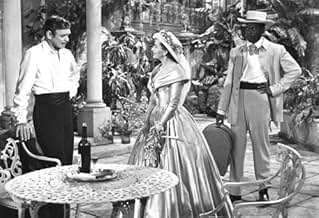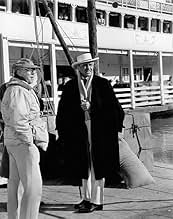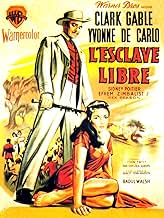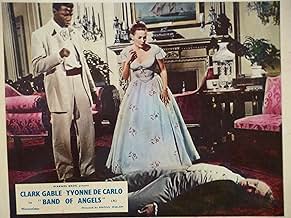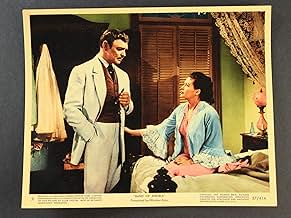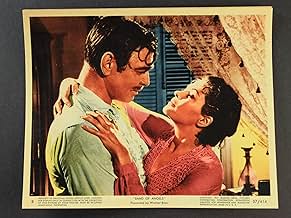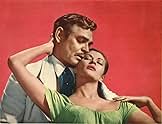Amantha Starr crece como una sureña privilegiada en el sur de antes de la guerra, pero después de que su padre muera arruinado, su mundo se destruye cuando descubre que su madre era negra.Amantha Starr crece como una sureña privilegiada en el sur de antes de la guerra, pero después de que su padre muera arruinado, su mundo se destruye cuando descubre que su madre era negra.Amantha Starr crece como una sureña privilegiada en el sur de antes de la guerra, pero después de que su padre muera arruinado, su mundo se destruye cuando descubre que su madre era negra.
- Dirección
- Guión
- Reparto principal
- Jimmee
- (as Russ Evans)
- Gillespie
- (sin acreditar)
- Auction Guest
- (sin acreditar)
- Auctioneer
- (sin acreditar)
- Maj. Gen. Benjamin Butler
- (sin acreditar)
Reseñas destacadas
"Band of Angels" is a romantic epic that seems to be a soap opera with a story with many twists. The plot seems to be a melodramatic version of "Gone with the Wind" and Rau-Ru first attitude is ungrateful. The best moment of this melodrama is when Amantha discovers that she is considered a black woman and consequently a slave. Her situation is impressive and heartbreaking. The spoiled woman is suddenly transformed into a property of despicable men. My vote is seven.
Title (Brazil): "Meu Pecado Foi Nascer" ("My Sin Was to be Born")
Band of Angels is one of many pictures from this time to take a stand on racial issues, and yet even by the standards of the time it is a woefully misguided attempt. Rather than using Yvonne De Carlo's situation to demonstrate the horrors of slavery and make the point that a person's colour is skin deep, it seems to present her being branded black as something horrifying in itself. It holds up kindly masters in mitigation of slavery, and even goes so far as to condemn a slave (the Sidney Poitier character) who is ungrateful for this condescending attitude. There's also a full supporting cast of cringeworthy stereotypes – including a "mammy" – and all the drawling and eye-rolling that cinema had mostly put-paid to by this time. The makers of the movie meant well, I'm sure, but it is clearly a case of old Hollywood trying to do The Defiant Ones while still stuck in Gone with the Wind mode.
And yet there is much to be said for old Hollywood. Walsh's dynamic direction brings an iconic look to scenes like Gable and De Carlo's kiss during the storm. He brings real intensity to the duel between Gable and Raymond Bailey, stealthily moving the camera forward as the two men get closer to each other (a trick he first used in his 1915 feature debut, Regeneration). Despite his age Gable is still very much the virile, eye-catching lead man, and this is a decent performance from him – check out the look in his eyes when he slaps his rival at the slave auction. There is also some achingly beautiful cinematography from Lucien Ballard, with some gorgeous Southern scenery and really effective lighting of interiors, achieving a look with candlelight and shadow that was hard to pull off in Technicolor. Band of Angels is, if nothing else, a movie to be enjoyed visually – and in this way more than any other harks back to a bygone age.
One of his new charities is Yvonne DeCarlo who received one rude shock when her father died. Her mom was black, one of the plantation slaves and she is technically one also. She's not the mistress of her father's plantation, she along with the rest of the property, real and human, is to be sold for back taxes.
Gable buys her and sets her up in his New Orleans home. Also in that house is a young black man named Ra-Ru played by Sidney Poitier. Poitier, in violation of the laws of the time, has been educated. And he's acquired enough education to appreciate the situation he's in. He's got a great hate for his benefactor who he really sees as no different than other, crueler slave holders.
Today's audience which has seen Steven Spielberg's great true film Amistad about the illegal African slave trade, can appreciate far better Gable's dilemma. It's as if the owners of the Amistad grew a conscience. Gable's description of life in the slave trade when he levels with Yvonne DeCarlo is a high point of the film as is his description of the rescue of an African baby who grew up to be Sidney Poitier.
The film does borrow liberally from Gone With the Wind in terms of Gable's character. But it also borrows from Birth of a Nation. Catch the scenes at his plantation on the delta when his slaves greet him and DeCarlo coming off the riverboat. Very much in keeping with that flawed classic. Had Gable done this film at his former studio MGM, I'm sure Ava Gardner would have been cast opposite him. Though DeCarlo is fine, Ava would have made the part a classic.
Actually it's Poitier who walks off with the acting honors here. His Ra-Ru is filled with fire and passion. What Gable thought of as an act of kindness, is not perceived by Poitier as that. He's educated enough to see exactly the institution of slavery for the dehumanizing force that it is. His confrontation with another plantation owner, Patric Knowles, when he tries to force himself on DeCarlo is not something one with the slave mentality would do. Knowles makes a big mistake in assuming Poitier thinks that way.
Actually Patric Knowles has another important scene with Gable after Poitier assaults Knowles and escapes. Gable has no use for him at all. He's originally from New England and doesn't like southern aristocrats as a group. Though Knowles is reputed to be a dead shot as a duelist, Gable faces him down and makes him turn tail in my favorite scene in the film.
Band of Angels did not get the best of reviews at the time it came out. I think it was ahead of its time and can be better appreciated by audiences today.
¿Sabías que...?
- CuriosidadesThe film proved to be a complete failure on release, both critically and commercially. Clark Gable was annoyed by the comparisons with Lo que el viento se llevó (1939) and instructed his agent, "If it doesn't suit an old geezer with false teeth, forget about it." He also decided to part company with Raoul Walsh, previously one of his favorite directors.
- PifiasAt 40 minutes, the heroine takes off her stockings, which were not yet available in those days.
- Citas
Amantha Starr: You say you won't touch me. You give me your *word* as a gentleman. Well, what's to stop you from breakin' your word late one night and forcin' yourself on me while I sleep?
Hamish Bond: [grins] Only the word of a gentleman.
Amantha Starr: [late that night, unable to sleep] He said he wouldn't. But those are his footsteps, coming down the hall. Coming closer!
[listens tensely]
Amantha Starr: He didn't! Not tonight, anyway. Why not?
[Frowning at first, she thinks it over, then gradually falls asleep]
- ConexionesEdited into La classe américaine (1993)
- Banda sonoraBand of Angels
Music by Max Steiner
Lyrics by Carl Sigman
Sung by Sarah Vaughan
Arranged by Murray Cutter (uncredited)
Selecciones populares
- How long is Band of Angels?Con tecnología de Alexa
Detalles
- Fecha de lanzamiento
- País de origen
- Idiomas
- Títulos en diferentes países
- L'esclava lliure
- Localizaciones del rodaje
- Empresa productora
- Ver más compañías en los créditos en IMDbPro
Taquilla
- Recaudación en todo el mundo
- 315 US$
- Duración2 horas 5 minutos
- Relación de aspecto
- 1.85 : 1
Contribuir a esta página



